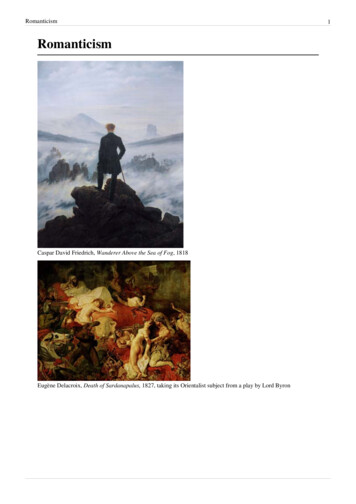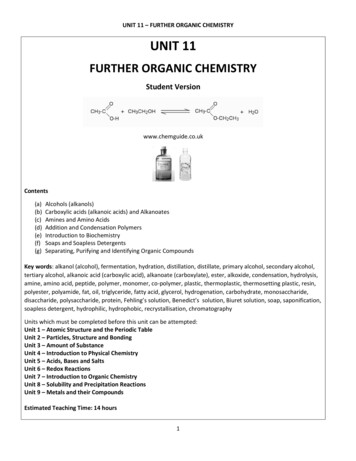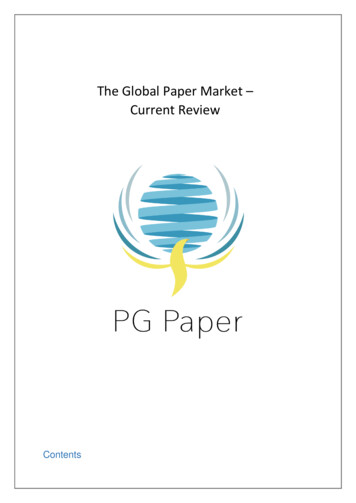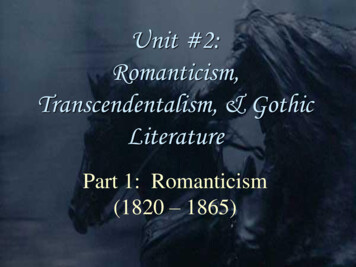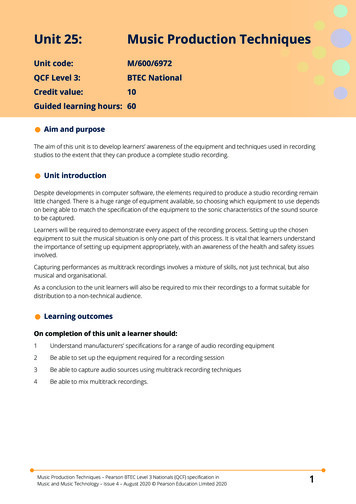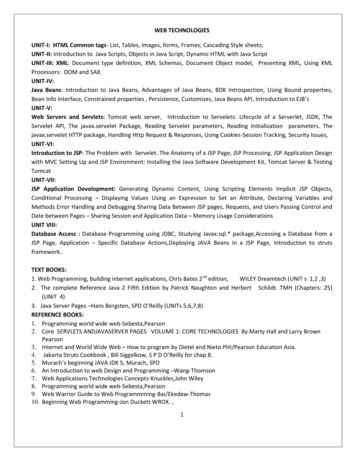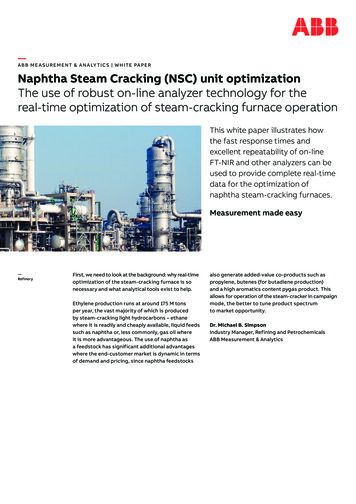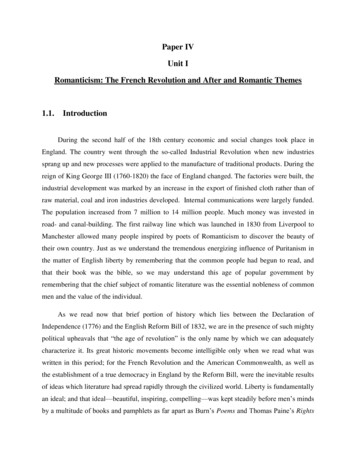
Transcription
Paper IVUnit IRomanticism: The French Revolution and After and Romantic Themes1.1.IntroductionDuring the second half of the 18th century economic and social changes took place inEngland. The country went through the so-called Industrial Revolution when new industriessprang up and new processes were applied to the manufacture of traditional products. During thereign of King George III (1760-1820) the face of England changed. The factories were built, theindustrial development was marked by an increase in the export of finished cloth rather than ofraw material, coal and iron industries developed. Internal communications were largely funded.The population increased from 7 million to 14 million people. Much money was invested inroad- and canal-building. The first railway line which was launched in 1830 from Liverpool toManchester allowed many people inspired by poets of Romanticism to discover the beauty oftheir own country. Just as we understand the tremendous energizing influence of Puritanism inthe matter of English liberty by remembering that the common people had begun to read, andthat their book was the bible, so we may understand this age of popular government byremembering that the chief subject of romantic literature was the essential nobleness of commonmen and the value of the individual.As we read now that brief portion of history which lies between the Declaration ofIndependence (1776) and the English Reform Bill of 1832, we are in the presence of such mightypolitical upheavals that “the age of revolution” is the only name by which we can adequatelycharacterize it. Its great historic movements become intelligible only when we read what waswritten in this period; for the French Revolution and the American Commonwealth, as well asthe establishment of a true democracy in England by the Reform Bill, were the inevitable resultsof ideas which literature had spread rapidly through the civilized world. Liberty is fundamentallyan ideal; and that ideal—beautiful, inspiring, compelling—was kept steadily before men’s mindsby a multitude of books and pamphlets as far apart as Burn’s Poems and Thomas Paine’s Rights
of Man—all read eagerly by the common people, all proclaiming the dignity of common life, andall uttering the same passionate cry against every form of class or caste oppression.First the dream, the ideal in some human soul; then the written word which proclaims it,and impresses other minds with its truth and beauty; then the united and determined effort ofmen to make the dream a reality—that seems to be a fair estimate of the part that literature playsin the political progress of a country.Romanticism was the greatest literary movement in the period between 1770-1840. Itmeant the shift of sensibility in art and literature and was based on interdependence of Man andNature. It was a style in European art, literature and music that emphasized the importance offeeling, emotion and imagination rather than reason or thought. The Romantic Period ofliterature came into being in direct reaction against a variety of ideas and historical happeningstaking place in England and Europe at that time. These happenings include the Napoleonic Warsand their following painful economic downfalls; the union with Ireland: the political movementknown as Chartism, which helped to improve social recognition and conditions of the lowerclasses: the passage of the Reform Bill which suppressed slavery in the British Colonies, curbedmonopolies, lessened poverty, liberalized marriage laws, and expanded educational facilities forthe lower classes, it both accepted and despised the current philosophy of utilitarianism, a viewin which the usefulness of everything, including the individual was based on how beneficial itwas to Society. Finally, the most important factor to impact a change in both thought andliterature was that of the Industrial Revolution. The Industrial Revolution brought about vastchanges in English society. It helped to create both great fortunes and great hardship. Within ashort time England went from being a country of small villages with independent craftsmen to acountry of huge factories run by sweat shops full of men, women, and children who lived inovercrowded and dangerous city slums. An industrial England was being born in pain andsuffering. The presence of a developing democracy, the ugliness of the sudden growth of cities,the prevalence of human pain, the obvious presence of the "profit motive" all helped tocharacterize what was in many respects" the best of times. the worst of times."In England the Romantic authors were individuals with many contrary views. But all ofthem were against immoral luxuries of the world, against injustice and inequality of the society,against suffering and human selfishness.
The period of Romanticism in England had its peculiarities. The Romantic writers ofEngland did not call themselves romanticists (like their French and German contemporaries).Nevertheless, they all depicted the interdependence of Man and Nature. The Romantic writersbased their theories on the intuition and the wisdom of the heart. On the other hand, they wereviolently stirred by the suffering of which they were the daily witnesses. They hoped to find away of changing the social order by their writing, they believed in literature being a sort ofMission to be carried out in order to reach the wisdom of the Universe.1.1.1 The Concept of RomanticismThroughout history certain philosophies or ideas have helped to shape the themes ofliterature, art, religion, and politics. The concept of Romanticism was preceded by thephilosophy of Neoclassicism. In the writings before this period humans were viewed as beinglimited and imperfect. A sense of reverence for order, reason, and rules were focused upon.There was distrust for innovation and invention. Society was encouraged to view itself as a groupwith generic characteristics. The idea of individualism was looked upon with disfavor. Peoplewere encouraged through literature, art, religion, and politics to follow the traditional rules of thechurch and government. However, by the eighteenth and nineteenth centuries a great reactionagainst this philosophy was noted. It was labeled as Romanticism.The expression Romantic gained currency during its own time, roughly 1780-1850.However, even within its own period of existence, few Romantics would have agreed on ageneral meaning. Perhaps this tells us something. To speak of a Romantic era is to identify aperiod in which certain ideas and attitudes arose, gained currency and in most areas ofintellectual endeavor, became dominant. That is, they became the dominant mode of expression.Which tells us something else about the Romantics: expression was perhaps everything to them - expression in art, music, poetry, drama, literature and philosophy. Just the same, older ideas didnot simply wither away. Romantic ideas arose both as implicit and explicit criticisms of 18thcentury Enlightenment thought. For the most part, these ideas were generated by a sense ofinadequacy with the dominant ideals of the Enlightenment and of the society that produced them.
Thus, Romanticism was an artistic, literary, and intellectual movement that originated inEurope toward the end of the 18th century and in most areas was at its peak in the approximateperiod from 1800 to 1850. Partly a reaction to the Industrial Revolution, it was also a revoltagainst the aristocratic social and political norms of the Age of Enlightenment and a reactionagainst the scientific rationalization of nature. It was embodied most strongly in the visual arts,music, and literature, but had a major impact on historiography, education and the naturalsciences. Its effect on politics was considerable and complex; while for much of the peakRomantic period it was associated with liberalism and radicalism, its long-term effect on thegrowth of nationalism was probably more significant.The movement validated intense emotion as an authentic source of aesthetic experience,placing new emphasis on such emotions as apprehension, horror and terror, and awe—especiallythat which is experienced in confronting the sublimity of untamed nature and its picturesquequalities: both new aesthetic categories. It elevated folk art and ancient custom to a noble status,made spontaneity a desirable characteristic (as in the musical impromptu), and argued for anatural epistemology of human activities, as conditioned by nature in the form of language andcustomary usage. Romanticism reached beyond the rational and Classicist ideal models to raise arevived medievalism and elements of art and narrative perceived to be authentically medieval inan attempt to escape the confines of population growth, urban sprawl, and industrialism.Romanticism embraced the exotic, the unfamiliar, and the distant, harnessing the power of theimagination to envision and to escape.1.2.Reaction Against EnlightenmentRomanticism appeared in conflict with the Enlightenment. You could go as far as to saythat Romanticism reflected a crisis in Enlightenment thought itself, a crisis which shook thecomfortable 18th century philosophe out of his intellectual single-mindedness. The Romanticswere conscious of their unique destiny. In fact, it was self-consciousness which appears as one ofthe keys elements of Romanticism itself.
The philosophes were too objective -- they chose to see human nature as somethinguniform. The philosophes had also attacked the Church because it blocked human reason. TheRomantics attacked the Enlightenment because it blocked the free play of the emotions andcreativity. The philosophe had turned man into a soulless, thinking machine -- a robot. In acomment typical of the Romantic thrust, William Hazlitt (1778-1830) asked, "For the better partof my life all I did was think." And William Godwin (1756-1836), a contemporary of Hazlitt’sasked, "what shall I do when I have read all the books?" Christianity had formed a matrix intowhich medieval man situated himself. The Enlightenment replaced the Christian matrix with themechanical matrix of Newtonian natural philosophy. For the Romantic, the result was nothingless than the demotion of the individual. Imagination, sensitivity, feelings, spontaneity andfreedom were stifled -- choked to death. Man must liberate himself from these intellectualchains.Like one of their intellectual fathers, Jean Jacques Rousseau (1712-1778), the Romanticsyearned to reclaim human freedom. Habits, values, rules and standards imposed by a civilizationgrounded in reason and reason only had to be abandoned. "Man is born free and everywhere heis in chains," Rousseau had written. Whereas the philosophes saw man in common that is, ascreatures endowed with Reason the Romantics saw diversity and uniqueness. That is, those traitswhich set one man apart from another, and traits which set one nation apart from another.Discover yourself -- express yourself, cried the Romantic artist. Play your own music, write yourown drama, paint your own personal vision, live, love and suffer in your own way. So instead ofthe motto, "Sapere aude," "Dare to know!" the Romantics took up the battle cry, "Dare to be!"The Romantics were rebels and they knew it. They dared to march to the tune of a differentdrummer -- their own. The Romantics were passionate about their subjectivism, about theirtendency toward introspection. Rousseau’s autobiography, The Confessions (1781), began withthe following words:I am commencing an undertaking, hitherto without precedent and which will never find animitator. I desire to set before my fellows the likeness of a man in all the truth of nature, and thatman myself. Myself alone! I know the feelings of my heart, and I know men. I am not made likeany of those I have seen. I venture to believe that I am not made like any of those who are inexistence. If I am not better, at least I am different.
Romanticism was the new thought, the critical idea and the creative effort necessary tocope with the old ways of confronting experience. The Romantic era can be considered asindicative of an age of crisis. Even before 1789, it was believed that the ancien regime seemedready to collapse. Once the French Revolution entered its radical phase in August 1792, the fearof political disaster also spread. King killing, Robespierre, the Reign of Terror, and theNapoleonic armies all signaled chaos -- a chaos which would dominate European political andcultural life for the next quarter of a century.Meanwhile, the Industrial Revolution -- in full swing in England since the 1760s -spread to the Continent in the 1820s, thus adding entirely new social concerns. The old order -politics and the economy -- seemed to be falling apart and hence for many Romantics, raised thethreat of moral disaster as well. Men and women faced the need to build new systems ofdiscipline and order, or, at the very least, they had to reshape older systems. The era was prolificin innovative ideas and new art forms. Older systems of thought had to come to terms with rapidand apparently unmanageable change.In the midst of what has been called the Romantic Era, an era often portrayed as devotedto irrationality and "unreason," the most purely rational social science -- classical politicaleconomy -- carried on the Enlightenment tradition. Enlightenment rationalism continued to beexpressed in the language of political and economic liberalism. For example, Jeremy Bentham’s(1748-1832) radical critique of traditional politics became an active political movement knownas utilitarianism. And revolutionary Jacobinism inundated English Chartism -- an Englishworking class movement of the 1830s and 40s. The political left on the Continent as well asmany socialists, communists and anarchists also reflected their debt to the heritage of theEnlightenment.The Romantics defined the Enlightenment as something to which they were clearlyopposed. The philosophes oversimplified. But Enlightenment thought was and is not a simpleand clearly identifiable thing. In fact, what has often been identified as the Enlightenment borevery little resemblance to reality. As successors to the Enlightenment, the Romantics were oftenunfair in their appreciation of the 18th century. They failed to recognize just how much theyshared with the philosophes. In doing so, the Romantics were similar to Renaissance humanistsin that both failed to perceive the meaning and importance of the cultural period which had
preceded their own. The humanists, in fact, invented a "middle age" so as to define themselvesmore carefully. As a result, the humanists enhanced their own self-evaluation and prestige intheir own eyes. The humanists foisted an error on subsequent generations of thinkers. Their errorlay in their evaluation of the past as well as in their simple failure to apprehend or even show aremote interest in the cultural heritage of the medieval world. Both aspects of the error areimportant.With the Romantics, it shows first how men make an identity for themselves by definingan enemy, making clear what they oppose, thus making life into a battle. Second, it is evidentthat factual, accurate, subtle understanding makes the enemy mere men. Even before 1789, theRomantics opposed the superficiality of the conventions of an artificial, urban and aristocraticsociety. They blurred distinctions between its decadent, fashionable Christianity or unemotionalDeism and the irreligion or anti-clericalism of the philosophes. The philosophes, expert indefining themselves in conflict with their enemy -- the Church -- helped to create the mythicalungodly Enlightenment many Romantics so clearly opposed.It was during the French Revolution and for fifty or sixty years afterward that theRomantics clarified their opposition to the Enlightenment. This opposition was based on equalmeasures of truth and fiction. The Romantics rejected what they thought the philosophesrepresented. And over time, the Romantics came to oppose and criticize not only theEnlightenment, but also ideas derived from it and the men who were influenced by it.The period from 1793 to 1815 was a period of European war. War, yes, but alsorevolutionary combat -- partisanship seemed normal. Increasingly, however, the Romanticsrejected those aspects of the French Revolution -- the Terror and Napoleon -- which seemed tothem to have sprung from the heads of the philosophes themselves. For instance, WilliamWordsworth (1770-1850) was living in Paris during the heady days of 1789 -- he was, at thetime, only 19 years old. In his autobiographical poem, The Prelude, he reveals his experience ofthe first days of the Revolution. Wordsworth read his poem to Samuel Taylor Coleridge (17721834) in 1805--I might add that The Prelude is epic in proportion as it weighs in at eightthousand lines. By 1805, the bliss that carried Wordsworth and Coleridge in the 1790s, had allbut vanished.
But for some Romantics, aristocrats, revolutionary armies, natural rights andconstitutionalism were not real enemies. There were new enemies on the horizon, especially afterthe Congress of Vienna (1814-1815). The Romantics concentrated their attack on theheartlessness of bourgeois liberalism as well as the nature of urban industrial society. Industrialsociety brought new problems: soulless individualism, economic egoism, utilitarianism,materialism and the cash nexus. Industrial society came under attack by new critics: the utopiansocialists and communists. But there were also men like Benjamin Disraeli (1804-1881) andThomas Carlyle (1795-1881) who identified the threat of egoism as the chief danger of theirtimes. Egoism dominated the bourgeoisie, especially in France and in England. Higher virtuesand social concerns were subsumed by the cash nexus and crass materialism of an industrialcapitalist society. Artists and intellectuals attacked the philistinism of the bourgeoisie for theirlack of taste and their lack of an higher morality. Ironically, the brunt of their attack fell on thesocial class which had produced the generation of Romantics.Romanticism reveals the persistence of Enlightenment thought, the Romantic’s definitionof themselves and a gradual awareness of a new enemy. The shift to a new enemy reminds usthat the Romantic Age was also an eclectic age. The Enlightenment was no monolithic structure - neither was Romanticism, however we define it. Ideas of an age seldom exist as total systems.Our labels too easily let us forget that past ideas from the context in which new ideas aredeveloped and expressed. Intellectuals do manage to innovate and their innovations areoftentimes not always recombinations of what they have embraced in their education. Intellectualand geographic contexts differ from state to state -- even though French culture seemed to havedominated the Continent during the early decades of the 19th century. England is the obviousexception. Germany is another example -- the movement known as Sturm und Drang (Storm andStress) -- was an independent cultural development.National variations were enhanced when, under the direct effect of the Napoleonic wars,boundaries were closed and the easy international interchange of ideas was inhibited. But warwas not the only element that contributed to the somewhat inhibited flow of ideas. Profoundantagonism and the desire to create autonomous cultures was also partially responsible. Thisitself grew out of newly found nationalist ideologies which were indeed characteristic ofRomanticism itself. And within each nation state, institutional and social differences provided
limits to the general assimilation of a clearly defined set of ideas. In France, for example, theacademies were strong and during the Napoleonic era, censorship was common. Artists andintellectuals alike were prevented from innovating or adopting new ideas. In Germany, on theother hand, things were quite different. The social structure, the heavy academism and specificinstitutional traits blocked any possibility of learning or expressing new modes of thought.Most important were the progressive changes in the potential audience artists andintellectuals now faced -- most of them now had to depend upon that audience. Where theaudience was very small, as in Austria and parts of Germany, the results often ranged betweenthe extremes of great openness to rigid conservatism. Where the audience was steadily growing,as in France or England, and where urbanization and the growth of a middle class wastransforming the expectations of the artist and intellectual, there was room for experiment,innovation and oftentimes, disastrous failure. Here, artists and intellectuals could no longerdepend upon aristocratic patronage. Popularity among the new and powerful middle classaudience became a rite of passage.At the same time, intellectuals criticized the tasteless and unreceptive philistinebourgeoisie. Ironically, they were criticizing the same class and the same mentality from whichthey themselves had emerged and which had supported them. In this respect, the Romantic agewas similar to the age of Enlightenment. A free press and careers open to talent providedpossibilities of competitive innovation. This led to new efforts to literally train audiences to bereceptive to the productions of artists and intellectuals. Meanwhile, literary hacks and GrubStreet writers produced popular pot boilers for the masses. All these characteristics placed limitsupon the activities of the Romantics. These limits could not be ignored. In fact, these limits oftenexerted pressures that can be identified as causes of the Romantic movement itself.There were direct, immediate and forceful events that many British and EuropeanRomantics experienced in their youth. The French Revolution was a universal phenomenon thataffected them all. And the Napoleonic wars after 1799 also influenced an entire generation ofEuropean writers, composers and artists. Those who were in their youth in the 1790s felt a chasmdividing them from an earlier, pre-revolutionary generation. Those who had seen Napoleonseemed different and felt different from those who were simply too young to understand. Thedifference lay in a great discrepancy in the quality of their experience. Great European events,
such as the Revolution and Napoleon, gave identity to generations and made them feel as one -- ashared experience. As a consequence, the qualities of thought and behavior in 1790 wasdrastically different from what it was in 1820. In the Romantic era, men and women felt thesetemporal and experiential differences consciously and intensely. It is obvious, I suppose, thatonly after Napoleon could the cults of the hero, of hero worship and of the genius take full form.And only after 1815 could youth complain that their time no longer offered opportunities forheroism or greatness -- only their predecessors had known these opportunities.The intellectual historian or historian of ideas always faces problems. Questions ofmeaning, interpretation and an acceptance of a particular Zeitgeist, or climate of opinion or worldview is serious but difficult stuff. Although we frequently use words like Enlightenment orRomanticism to describe intellectual or perhaps cultural events, these expressions sometimescause more harm than good. There is, for instance, no 18th century document, no perfectexemplar or ideal type, to use Max Weber’s word, which can be called "enlightened." There is,unfortunately, no perfect document or ideal type of which we may pronounce, "this isRomantic."We have seen that one way to define the Romantics is to distinguish them from thephilosophes. But, for both the philosophes and the Romantics, Nature was accepted as a generalstandard. Nature was natural -- and this supplied standards for beauty and for morality. TheEnlightenment’s appreciation of Nature was, of course, derived wholly from Isaac Newton. Thephysical world was orderly, explicable, regular, logical. It was, as we are all now convinced, aNature subject to laws which could be expressed with mathematical certainty. Universal truths -like natural rights -- were the object of science and of philosophy. And the uniformity of Naturepermitted a knowledge which was rapidly accumulating as a consequence of man’s rationalcapacity and the use of science to penetrate the mysteries of nature. The Enlightenment definedknowledge in a Lockian manner--that is, a knowledge based on sense impressions. This was anenvironmentalist psychology, if you will, a psychology in which men know only what their senseimpressions allowed their faculty of reason to understand.The Enlightenment was rationalist -- it glorified human reason. Reason illustrated thepower of analysis -- Reason was the power of associating like experiences in order to generalizeabout them inductively. Reason was a common human possession -- it was held by all men. Even
American "savages" were endowed with reason, hence the 18th century emphasis on "commonsense," and the "noble savage." Common sense -- revealed by reason -- would admit agroundwork for a common morality. As nature was studied in order to discover its universalaspects, men began to accept that what was most worth knowing and what was therefore mostvaluable, was what they had in common with one another. Society, then, became an object ofscience. Society revealed self-evident truths about human nature -- self-evident truths aboutnatural rights.Social and political thought was individualistic and atomistic. As the physical universewas ultimately machinelike, so social organization could be fashioned after the machine. Sciencepronounced what society ought to become in view of man’s natural needs. These needs were notbeing fulfilled by the past -- for this reason, the medieval matrix and the ancien regime inhibitedman’s progress. The desire was to shape institutions, to change men and to produce a bettersociety -- knowledge, morality and human happiness. The intention was at once cosmopolitanand humanitarian.The Romantics felt all the opinions of the Enlightenment were fraught with dangerouserrors and oversimplifications. Romanticism may then be considered as a critique of theinadequacies of what it held to be Enlightened thought. The critique of the Romantics -sometime open, sometimes hidden -- can be seen as a new study of the bases or knowledge andof the whole scientific enterprise. It rejected a science based on physics -- physics wasinadequate to describe the reality of experience. "O for a life of sensations rather than ofthoughts," wrote John Keats (1795-1821). And William Blake (1757-1827) admonished us all to"Bathe in the waters of life." And Keats again, "Beauty is truth, truth beauty, -- that is all/Yeknow on earth, and all ye need to know."The Romantic universe was expanding, evolving, becoming -- it was organic, it wasalive. The Romantics sought their soul in the science of life, not the science of celestialmechanics. They moved from planets to plants. The experience was positively exhilarating,explosive and liberating -- liberation from the soulless, materialistic, thinking mechanism thatwas man. The 18th century had created it. The Romantics found it oppressive , hence the focuson liberation. Listen to the way Percy Bysshe Shelley (1792-1822) put it in PrometheusUnbound:
The joy, the triumph, the delight, the madness!The boundless, overflowing, bursting gladness,The vaporous exultation not to be confined!Ha! Ha! The animation of delightWhich wraps me, like an atmosphere of light,And bears me as a cloud is borne by its own wind.The Romantics returned God to Nature -- the age revived the unseen world, thesupernatural, the mysterious, the world of medieval man. It is no accident that the first gothicnovel appears early in the Romantic Age. Nature came to be viewed historically. The world wasdeveloping, it was a world of continuous process, it was a world in the process of becoming. Andthis continuous organic process could only be understood through historical thought. And herewe have come almost full circle to the views expressed by Giambattista Vico a century earlier.This is perhaps the single most revolutionary aspect of the Romantic Age. An admiration for allthe potency and diversity of living nature superseded a concern for the discovery of its universaltraits. In a word, the Romantics embraced relativism. They did not seek universal abstract lawsas Immanuel Kant (1724-1804) had. Instead, they saw history as a process of unfolding, abecoming. Was not this the upshot of what G. W. F. Hegel (1770-1831) had argued in hisphilosophy of history? And look at the time frame: Kant - 1780s, Hegel - 1820s and 30s.The Romantics sought Nature’s glorious diversity of detail -- especially its moral andemotional relation to mankind. On this score, the Romantics criticized the 18th century. Thephilosophe was cold, mechanical, logical and unfeeling. There was no warmth in the heart. Forthe Romantics, warmth of heart was found and indeed enhanced by a communion with Nature.The heart has reasons that Reason is not equipped to understand. The heart was a source ofknowledge -- the location of ideas "felt" as sensations rather than thoughts. Intuition was equatedwith that which men feel strongly. Men could learn by experiment or by logical process—butmen could learn more in intuitive flashes and feelings, by learning to trust their instincts. TheRomantics distrusted calculation and stressed the limitations of scientific knowledge. Therationality of science fails to apprehend the variety and fullness of reality. Rational analysisdestroys the naïve experience of the stream of sensations and in this violation, leads men intoerror.
One power possessed by the Romantic, a power distinct and superior to reason, wasimagination. Imagination might apprehend immediate reality and create in accordance with it.And the belief that the uncultured—that is, the primitive -
that their book was the bible, so we may understand this age of popular government by remembering that the chief subject of romantic literature was the essential nobleness of common men and the value of the individual. As we read now that brief
